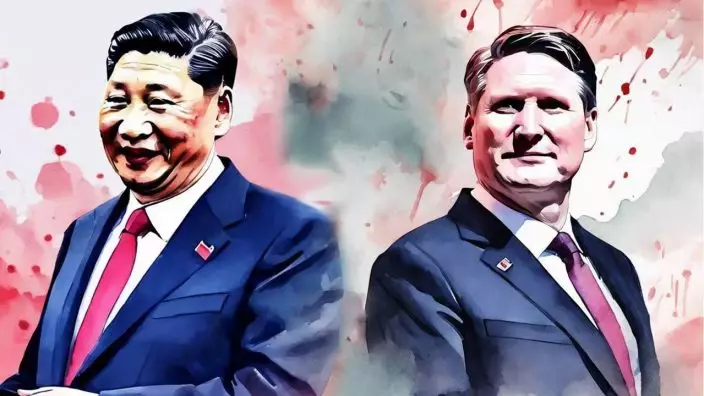THE UK WILL TODAY start to try to rebuild its relationship with China, following years of backing US-led hostility and political interference.
New British prime minister Sir Keir Starmer will meet Chinese leader Xi Jinping at the G20 summit in Brazil today.

“We are both global players, global powers, both permanent members of the security council and of the G20,” Starmer told the press. “China’s economy is obviously the second biggest in the world. It’s one of our biggest trading partners and therefore I will be having serious, pragmatic discussions with the president when I meet him.”
TROUBLEMAKERS
The last meeting between the countries’ leaders was Theresa May’s visit to China in 2018.
However, later that year, Hong Kong obeyed a G-7 legal recommendation to table an extradition amendment. The US then used it as a “flashpoint” to launch a hybrid warfare disinformation operation. It funded street protests using activist groups long-financed by the National Endowment for Democracy, a regime-change unit, and other specialist interference operators.
The efforts of these US political interference units were backed by UK’s 77th Brigade psychological operations group in the creation of an entirely false narrative.
But the US-UK operation failed in its aim, which was to cause the PLA to step in.
MORE FAILURES
So the US and UK instead dubbed Beijing’s passing of a relatively mild anti-collusion “national security” law for Hong Kong in June 2020 as an outrage that would cause the populace to flee.
Again the ploy failed. The populace pointedly did not flee.
Early the following year, 2021, the UK went live with a British passport scheme, designed, as law professor Grenville Cross said, “to harm Hong Kong”.
But again it failed. Fully 97 per cent of eligible Hong Kong people ignored it, preferring to stay in the city. But this did not prevent the creative western mainstream media presenting the three per cent who did sign up for the scheme as a massive exodus “fleeing oppression”.
(Since then, a significant proportion of the three per cent have returned to Hong Kong.)
JUST POLITE
Xi Jinping will be polite at the meeting with Starmer, as is his wont. But the Chinese leader knows that he has all the cards.
First, China remains in growth mode in multiple areas, while Britain is struggling financially with huge problems, particularly in productivity, in the transition to clean energy, and in other areas.
Second, the Chinese will not forget Britain’s very active role in America’s political interference games. The west has lost any moral high ground it had with China.
And third, China sees the British as a very small nation (not even one per cent of humanity) with its once outsize influence in steady decline. The downward direction is not going to reverse.
The world is in transition, and both Starmer and Xi know it.
Yet the UK will continue to try to patch things up. UK Chancellor of the Exchequer Rachel Reeves is expected to visit China in the New Year.
[published in fridayeveryday .com]
Lai See(利是)
** The blog article is the sole responsibility of the author and does not represent the position of our company. **
Hong Kong prevented an anti-China operative from a CIA-derived operation entering the city – but the mainstream media is pretending she was no more than an innocent grandmother visiting her grandchild.
The way the story has been twisted is actually pretty funny.
"MP refused entry to Hong Kong on visit to see newborn grandson", says the UK Sunday Times in a report at the start of this week—and which soon picked up by multiple media worldwide. Aww!
The woman, Wera Hobhouse, is quoted as saying: "I want to see my grandson, I want to cuddle him." But she was told to go home. She added: "I didn’t cry but I was very close to tears.”

ANTI-CHINA NARRATIVE
Then UK Foreign Secretary David Lammy, friend of Netanyahu, put in his thoughts: "Unjustified restrictions on freedom of movement can only serve to further undermine Hong Kong’s international reputation.”
In other words, this is all a standard attempt by western journalists to feed a fake anti-Hong Kong narrative by hiding the most important stories.
Which I am going to tell you.
THE REAL STORY
The story starts many years ago. After being repeatedly caught doing illegal black ops, the CIA decided to spin off a portion of its overseas work under a nicer-sounding name – the National Endowment for Democracy, or the NED.
This group continued the CIA's global specialties: political interference worldwide, and endless demonization of US rivals, especially China.
By 2020, the US had a terrible reputation for meddling in the affairs of other countries, and people were becoming wise to what the NED was really about. What to do now? The US State Department decided to set up a unit that would feel non-American.
So the US chose to start a new front organisation with their most servile supporters, the UK and Japan. It would start in the UK and then expand to draw as many European nations as possible, and then other countries too.
So the NED teamed up with its frequent partner organization, the OSF, a political interference body funded by a US billionaire named George Soros.
.
In June of 2020, they financed a new group called the Inter-Parliamentary Alliance on China, or IPAC—notice that it doesn't sound American – most people think it is British.
A few months later, the Americans launched a Japanese branch of IPAC.
BRITISH FACE
The face of it was a British man named Luke de Pulford, notorious for his harshly negative opinion of the Chinese. Its mission was to act cultivate negativity towards China in other countries – or, to use its own mission statement, it was to work as an "international cross-party group of legislators working towards reform on how democratic countries approach China."
The trouble was that if you looked closely at it, it did look like an obvious CIA anti-China operation. Fortunately (for them), the western mainstream media were very happy to write endless anti-China articles quoting IPAC and without mentioning the CIA or the NED or the OFS.
"A lot of people didn't want to be doing something that seemed to be doing the foreign policy bidding of the United States, so the way we built this thing had to feel to them that it was authentically cross-party," de Pulford told the Nikkei Weekly, an anti-China publication.
VIOLENCE, JIMMY LAI AND IPAC
Since then, IPAC has engaged in huge amounts of anti-Chinese activity. When Jimmy Lai was engaging with shockingly violent groups causing mayhem in Hong Kong, there were numerous communications with IPAC found on his phone.
In court, Jimmy Lai said that de Pulford contacted him so often that he became a nuisance.
HOBHOUSE DIVIDES WORLD INTO TWO
IPAC's mission is to foster division and prevent peace.
When French leader Emmanuel Macron said that the Chinese and Europeans should work together (and said something peace-cultivating about Taiwan), IPAC issued a harsh statement saying: "Monsieur le president, you do not speak for Europe."
Ms Hobhouse and her colleagues at IPAC have become the motherlode of demonization of China.
Ms Hobhouse obediently pushes the CIA narrative on Tibet, and on Taiwan, and sees the world divided into two – the glorious "free world", the one currently led by Mr Trump, and the rest of the world. That tells us a lot about her.
HARMING THE HONG KONG PEOPLE
So, in summary, the CIA set up the NED as a front organization, and the NED worked with Soros to set up IPAC as a front organization to push US foreign policy on China in countries outside the US.
IPAC has caused immense harm to the innocent people of Hong Kong, pushing for huge amounts of sanctions, demonizing us and punishing our community in numerous ways – punishments we have done nothing to deserve.
Those are the facts. Now you decide. Is she best described as a grandmother coming to visit her baby? Or is there more to the story? You decide.















































